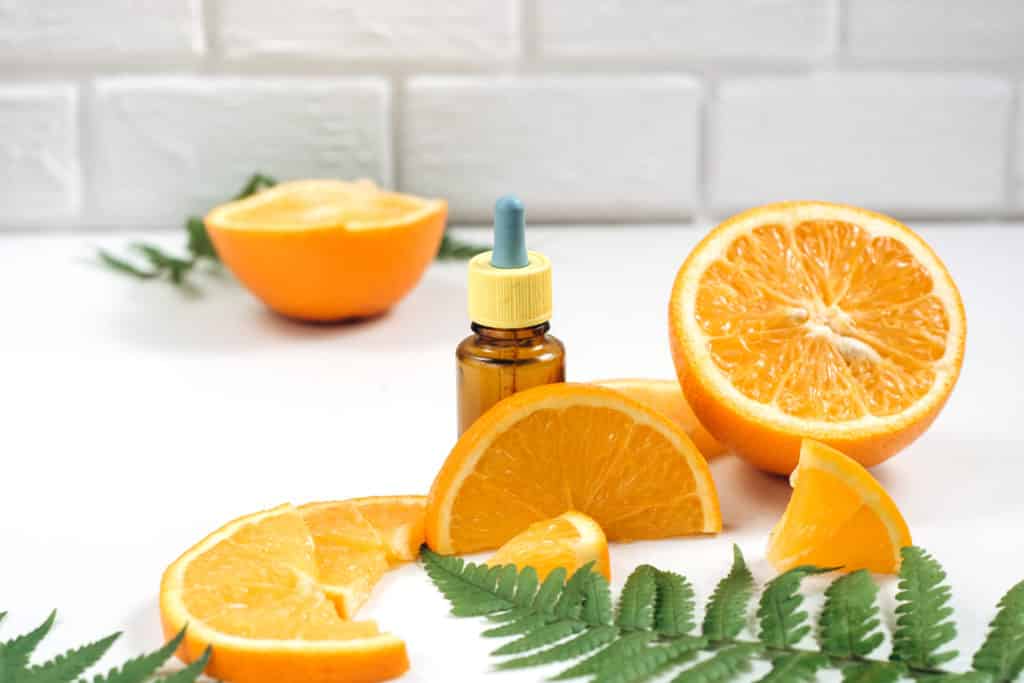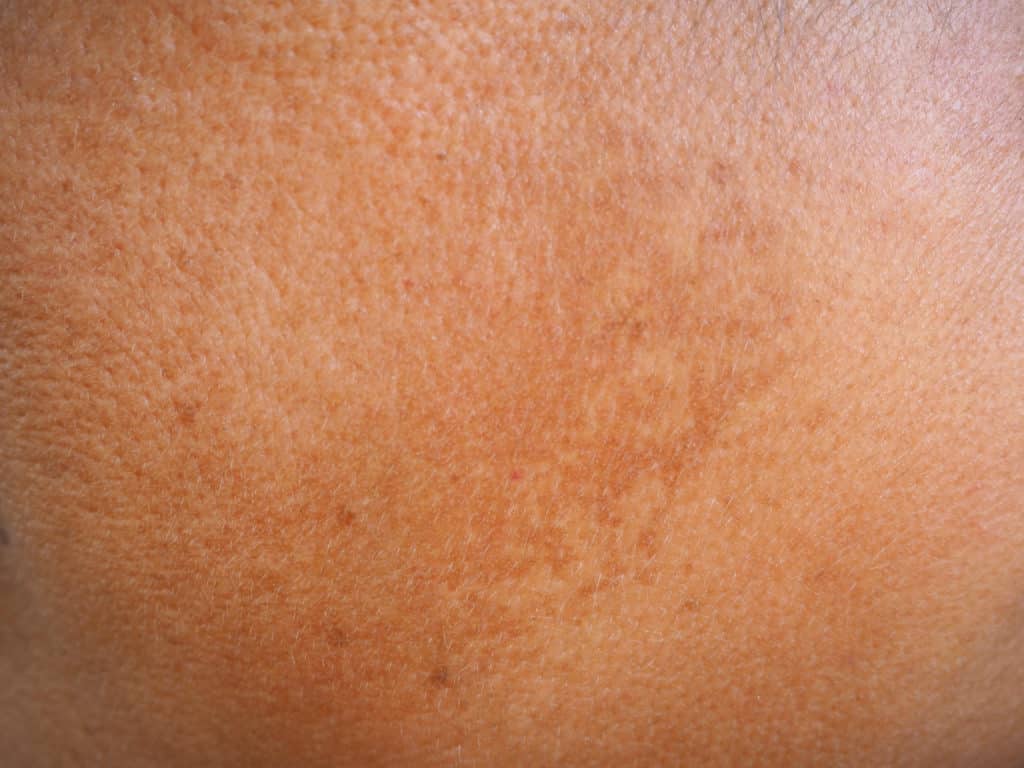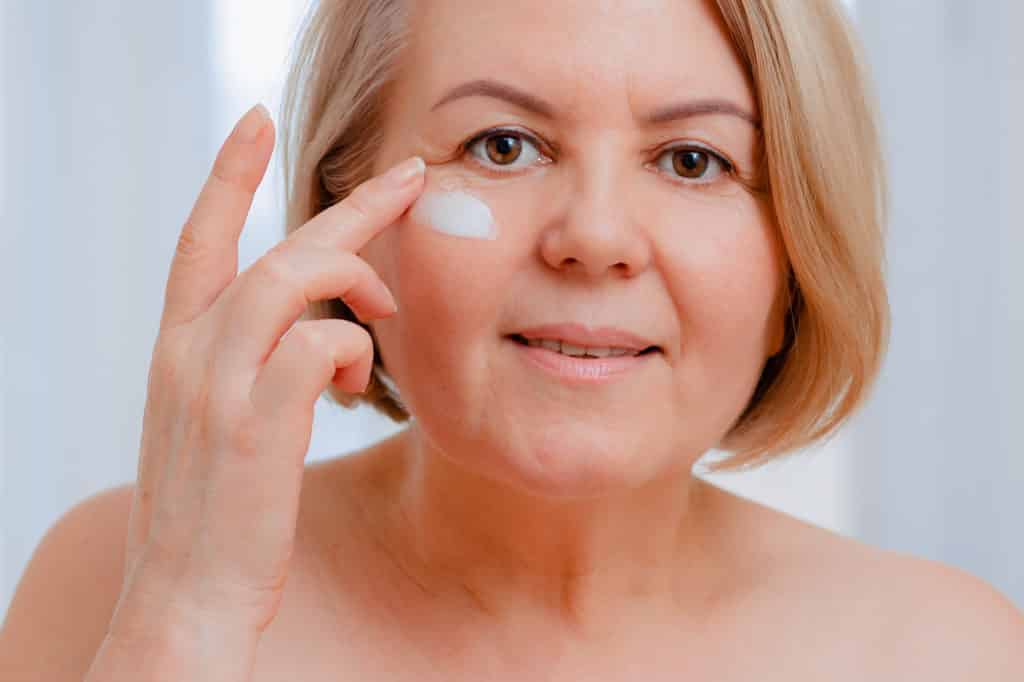What Does Vitamin C Serum (And Its Benefits) Do For Your Skin?
Vitamin C serums are so important to have among your skin care products that it almost makes more sense to ask, what benefits doesn’t vitamin c serum provide for your skin and face? You’ve probably seen these serums on top 10 must-have lists in beauty magazines or skincare blogs, and it’s no big surprise why.
Using vitamin C as a part of a complete skin care routine is kind of like how orange juice is a part of your complete breakfast. Vitamin C makes your beauty regimen and your breakfast that much better.

Now, who wants a mimosa? Wait – first let’s focus on some of the many benefits that vitamin C can bring to your skin and face. Actually, there’s no rule that says you can’t sip and see words at the same time, so go ahead and do what you will while you read.
Vitamin C, also referred to as ascorbic acid or l ascorbic acid, has several beauty-boosting benefits for your skin and face. Whether you use it night or day, serum with vitamin C can be one of the best additions to your skincare routine. The roles of vitamin C in skin care health are plentiful and potent. So let’s go into a little more detail about what you need to know for skin health and wellness.
1. Vitamin C benefits include brightening your day and your complexion
Apparently, consistency is a challenge even for our skin. While not everyone deals with the frustration of blotchy skin, or random dark spots, it’s a considerable concern for many people.
Vitamin C benefits include helping hyperpigmentation fade away so that your skin’s tone and coloration becomes more even over time. Hyperpigmentation occurs when melanin production goes into hyperdrive and is overproduced in certain areas. Sunspots, age spots, and melasma all come under that category of Hyperpigmentation.
You may have also heard the term chloasma, or “pregnancy mask,” which is when Melasma occurs in pregnant women. There may also be hyperpigmentation on areas of the face that were previously prone to acne – and just when you thought you’d be in the clear!

Vitamin C serums can start to address some of these issues caused by excess or erratic melanin production. The application of a topical Vitamin C formula in some subjects has been shown to slow melanin production. One medically reviewed publication suggests that vitamin C’s inhibition of melanin production may be due to “the vitamin’s ability to reduce the ortho-quinones generated by tyrosinase.” So if you want to get real specific and scientific about it, that is one assessment of the inner workings of the skin. And if you’ve already forgotten the words you just read, you can rest assured that The C and its benefits will still work its “magic” for you, whether or not you aced Chemistry class.
Here’s another quick fun fact on The C and its benefits: Vitamin C products also fight inflammation that can cause the production of excess melanin. Reducing inflammation also means you’ll have better results in fighting breakouts in the future.
When in doubt about using new products, always follow the medical advice of a dermatologist, and make sure you’re gentle with sensitive skin. Occasional side effects may include itchiness, irritation, and redness. So if you do experience any of that, you may want to avoid using that particular product and see what a dermatologist says.
2. Give your face the benefit of exfoliation
Our skin is the largest organ of the body. It consists of water, minerals, protein, lipids, and other chemicals. It’s there to protect us from infections and just generally keep the insides in and the outside out. With the weight of all those responsibilities, it’s no wonder our skin cells tap out after a certain amount of time, and hand the job over to the next shift.
We already know that our skin changes as we age, but we may not all be aware that it regenerates itself around every 27 days. That means the older cells wither and die (and slough off), and fresh cells are exposed, leading to a healthier, more youthful glow. Skin cell regeneration is a naturally occurring process, but sometimes we need to nudge it along to allow the newer cells to make their way to the surface sooner.
Here’s where vitamin C comes in to save the day once again. Since vitamin C is acidic, using vitamin C skin care products will help slough off dead skin cells. This exposes fresher cells and enhances the skin’s ability to regenerate new ones. When you use vitamin c topically it can also accelerate elastin and collagen production, adding to the overall anti-aging benefits for your face.
Collagen is a protein that makes skin look more plump and supple. Elastin helps with skin’s elasticity, or that healthy, springy quality. They are the reasons those sheet marks on your face don’t last all day long. Since vitamin C is essential for the synthesis and regulation of collagen (aka collagen production), adding topical vitamin c can bring back that bounce to your skin.
As you can see, the roles of vitamin C in skin health are varied and very important. If all these benefits don’t persuade you to use one or more forms of vitamin C for your skin and face, then I’m not sure what will.
If you are not accustomed to using a vitamin C serum regularly in your skin care routine, you can always try it as an occasional face refresher. Focus on that exfoliation factor, and the other collagen-boosting effects will follow.
You only need apply a few drops of vitamin C serum and spread it over your face and neck to soak up these benefits vitamin C is good for. Once you see the results, you’ll likely want to stick with it.
3. It’s totally radical how Vitamin C fights free radicals
In addition to evening out skin tone and brightening up your overall complexion, vitamin C benefits also include fighting against free radicals. These are molecules with at least one unpaired electron. That may not seem so bad, but the problem arises when they try to make up for that mismatch and “steal” an electron from other molecules. Free radicals can cause damage to the lipids, proteins, and even the DNA in our skin cells.
Free radicals occur naturally in our system, as do antioxidants which neutralize them. When they become out of balance, that is where problems arise. External elements like cigarette smoke, pesticides, and other environmental aggressors can cause the excessive formation of free radicals in the body.

Vitamin C just so happens to be a powerful antioxidant – another amazing benefit – that helps protect skin from the damage that free radicals can do. Vitamin C products can neutralize these marauding molecules by donating electrons. Since these troublesome molecules cause inflammation and oxidative stress, this is great news for your face. If you use a vitamin C serum it can work against the effects of sun damage – one of those aforementioned environmental aggressors. That means such a serum or cream can reduce fine lines and wrinkles, as well as dark spots. Most vitamin C products work well with a variety of skin types, even sensitive skin. Just to a patch test or try a small amount first.
The reduction of free radicals allows for and actually encourages collagen synthesis, which, as mentioned above, is important for skin’s firmness.
4. Vitamin C is a wonder at wound healing
We’ve already mentioned many of the benefits of vitamin C above, so it may not be shocking that a topical application of vitamin C would encourage the healing of wounds on the skin as well. The fact that it has free-radical fighting power is part of it, as is the capacity to reduce skin inflammation. When skin is swollen and puffy, it’s not in an ideal place for healing.
In addition, there is evidence in medically reviewed journals and studies that suggest vitamin C can lead to an increase in dermal fibroblasts. Fibroblasts are essential functions within the skin that help with wound healing. Feel free to click on the link for a more in-depth description that will provide flashbacks to chemistry class. Vitamin C benefits have been shown to repair damage to the epidermis caused by oxidation. It plays a good role in remodeling tissue and ultimately, repairing skin wounds.
Vitamin C’s ability to help heal wounds also means that there is a reduced risk of infection and scarring. It’s one more way that it can smooth the skin’s surface and reduce dullness. Even though it’s vitamin C, ascorbic acid gets an A! Maybe it’s a weighted grading scale or something, but vitamin C is definitely the teacher’s pet in skincare circles. So listen to what the teacher says, and give it a try.
Here’s a video from AbrahamThePharmacist that discusses wound healing and mentions the most important vitamins for the recovery process:
5. Vitamin C serum benefits include reducing the appearance of fine lines and under-eye circles
If those wrinkles and under-eye circles are making you seem more tired and weary than you really are, vitamin C may just be your serum in shining armor. Of course, you might also want to consider getting more sleep and making sure your diet isn’t doing you wrong. Aside from a genetic predisposition to under-eye circles, sleep is the likeliest culprit.
However, if you’ve done all you can do to optimize your eating and sleeping habits, there are ways to fight these effects from the outside in, and vitamin C may be just the weapon you need to help protect your skin.
Many people have found that vitamin C serum helps decrease darkness under the eyes, in addition to dealing with puffiness or “eye bags.” If the darkness under the eyes is caused by hyperpigmentation, then it would be consistent with the information shared above.
Specifically, since vitamin C has the capacity to impede the production of excess melanin that contributes to uneven coloration, it could have a positive and beneficial impact on skin tone. Vitamin C serums’ benefits may also help increase blood flow to the area under your eyes, strengthening the blood vessels and ameliorating the dark circles.

A vitamin C serum may make only a slight lightening change in your skin’s color, but it is also likely to hydrate and plump up the area, smoothing out those fine lines that make us fret. Slowing the signs of aging is a pretty satisfying side effect, right? I mean, when has reducing the appearance of wrinkles ever been a bad thing? Okay, I suppose the charpei puppy is one very cute exception to the rule. But other than that, most of us will take the wisdom and can do without at least some of the wrinkles as we age.
Now that you know even more than you might really need to know about vitamin C, you may be wondering, what’s the best product or serum to use? Well, that’s an excellent question, so get ready for a pretty excellent answer.
A product like Viviane Woodards Vitamin C Restoring Serum, which is one of the best – if not the best – vitamin C serums in the skin care world, will bring about so many benefits to your skin that you’ll wonder why you didn’t use it before. It defends your face against that oxidative stress that leads to premature aging, and reduces the appearance of wrinkles (again, no offense charpeis, you are adorable, and we could probably learn a little about self love from you).
This Vitamin C Restoring Serum gently exfoliates the surface level of skin to reveal a radiant, more youthful-looking layer underneath. As mentioned earlier, the ability of vitamin C to boost the production of collagen means even more firm and supple skin wherever it’s applied. That’s a good reminder to make sure you smooth it all over, including the area under your eyes. Also – don’t forget the neck and décolletage, as we often focus only on the face. The eye area will likely see an improvement in both brightness and tone, as the serum strengthens capillaries and increases circulation.
While vitamin C may be doing the heavy lifting, the serum includes powerful nourishing and moisturizing extracts of Rose Hips, Chamomile, Green Tea, and Aloe Vera. It also contains the always amazing Hyaluronic Acid which helps hydrate skin and will boost collagen production.
And, here’s a bonus lip tip, since we’re on the subject of vitamin C. If you want your lips to be luscious and match that marvelous new glow you’ll have, try the Radiant Vitamin C Lip Treatment. A product with vitamin c that also contains vitamin E is a great way to double down on that antioxidant power and protect the skin.
—
For over 60 years, Viviane Woodard has represented “The Purity of Skincare”. We are the leading beauty brand for water-based skin care products and promote the importance of good skin hydration. Follow us on Facebook, Instagram, Twitter, and Pinterest for skin care tips, product discounts and more.
